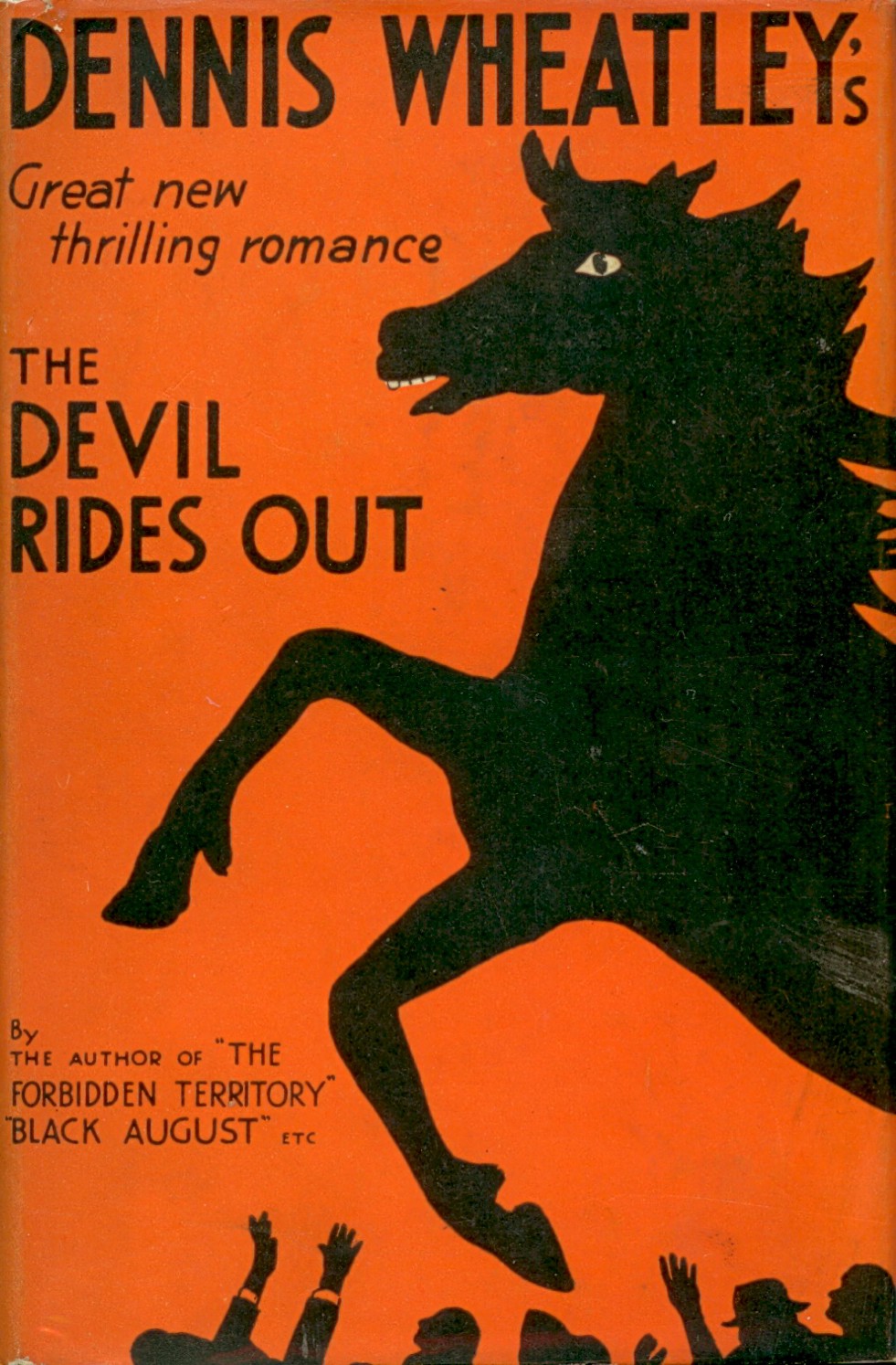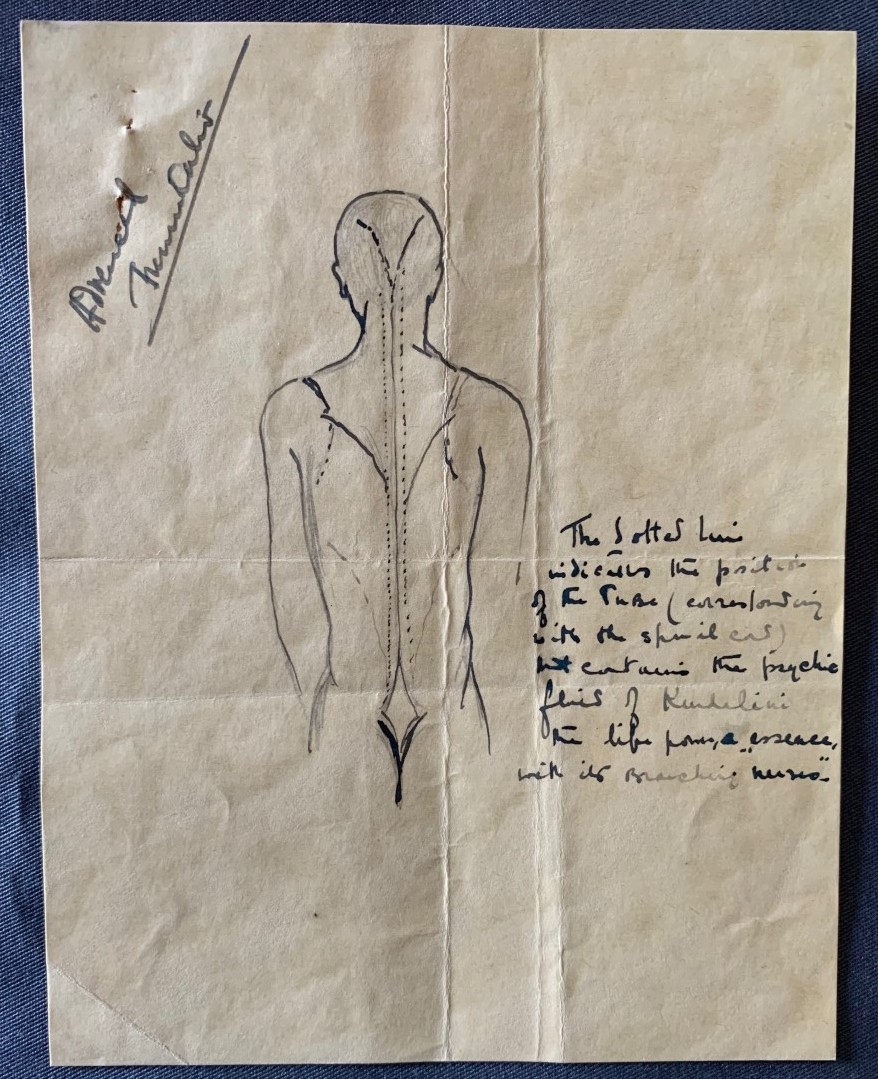
 |
Floor Plan |  |
The Dennis Wheatley 'Museum' - Champions of Reincarnation: Dennis Wheatley & Joan Grant
DW's religious beliefs, before and after 'The Devil Rides Out'
'The Devil Rides Out'
(1934)
Click on the image to enlarge
Rollo Ahmed's lessons on Yoga
(see also The Museum, Room Seven)
Click on the image to enlarge
There is no doubt that, in general terms, DW believed in re-incarnation from a relatively early age, and as he wrote in his introduction to Charles Beatty's 'Gate of Dreams' in 1972 :
'Winged Pharaoh came as no revelation to me. From the time I was old enough
to think about such matters I had instinctively recognised the childish absurdity
of a teaching that one survived death but would be judged for all eternity on
one's performance during a single lifetime.
Either we have an intangible something in us that survives death, or we do not
have. It seems unlikely that any cast-iron proof of life after death will ever be
forthcoming, but the cumulative evidence for the belief that some portion of
our personality does survive is overwhelming. If one accepts that belief, the
only just and logical explanation for what happens to our egos when they
leave our bodies is reincarnation.'
And it perhaps gives an insight into DW's mind that he says 'the only just and logical explanation'. He does not deny that there is another explanation about what happens after death - i.e. that there is nothing; but he rejects it, because having seen so much suffering in World War One, he wishes to believe there is something just, and if he is going to believe in something just, it should as far as possible be something logical as well ... in this he was not, perhaps, unlike Conan Doyle.
But the fact that DW believed in reincarnation does not mean that he believed everything that he wrote. After all, he was the author who 'made the incredible seem absolutely real'.
Did DW believe in the Devil, in the power of Black Magicians, in the efficacy of Pentacles, or the existence of something called the 'Sussamma Ritual' ?
DW certainly believed you shouldn't take chances and assume the Devil definitely didn't exist. In his memoirs he recounted how he was once playing cards and invoked the Devil to give him luck; and that this was succeeded by a succession of winning hands. He said it shook him and taught him not to tempt fate, and I see no reason to disbelieve him. He was too old to need marketing by the time he told the story.
As for the power of Black Magicians, or at least the current crop, almost certainly not. When he met Crowley while doing his preliminary research, Crowley was 'on his uppers', and for a while after that meeting DW had to be quite deft in refusing further requests to meet - and to be asked for money, no doubt.
And as for the efficacy of Pentacles and the Sussamma ritual, it is harder to be sure with the former than the latter, but my guess is not in either. After all, how can one believe in something one has borrowed from another author's fictional work ?
DW did clearly believe in Palmistry (see 'Officer and Temporary Gentleman page 201) and probably also in Numerology (see one of the exhibits in Room Seven for how he experimented with his own and Melvyn Baron's numbers as well as Simon Aron's), and he certainly believed in Yoga sufficiently to take lessons from Rollo Ahmed for a while and to express an interest in how to arouse Kundalini.
DW said he saw a ghost at his prep school (see 'The Young Man Said' pp 62-64) and during an interlude in World War One he had another strange para-normal experience (see 'Officer and Temporary Gentleman' pp 193-196). Phil Baker is inclined to believe in the veracity of the first incident, whatever its underlying explanation (pp 38-40), but is less convinced by the second tale (pp132-134). We may never know, but my guess is that DW did have both experiences. DW's tale of disguising himself and absconding from HMS Worcester was doubted at one time, but his correspondence with Hilda Baker (see Room Four) shows that it really did happen. So in most things of this nature I'm inclined to give DW the benefit of the doubt.
DW also believed that some people could see through the veil of time into the future. In his autobiography he wrote about how he consulted the seer Henry Dewhurst on several occasions in the early 1930s, and how Dewhurst predicted not only that he would become a famous author but also the date on which he would hear that his book had been accepted for publication (see Drink & Ink pages 84-7,111-12,113). Dewhurst (spelt Dewhirst in DW's introduction to the first of the Neils Orsen stories in 'Gunmen, Gallants and Ghosts') was to be the model for DW's psychic investigator Neils Orsen in a series of short stories in 'Gunmen, Gallants and Ghosts' later on.
DW had a definite interest in Theosophy. He had a book signed by Blavatsky or her co-author (she died some years before DW was born) and a couple of other books on Theosophy in his Library; and whatever else he may have believed from her writings, it seems that DW was a believer in her 'Hidden Masters' or 'Mahatmas', some of whom Blavatsky alleged she had actually met, although this was later called into question by others. That DW found much in Theosophy that appealed to him is certain, and when he published Blavatsky's 'Studies in Occultism' in his Library of the Occult in the nineteen seventies, DW ended his introduction by stating that 'we must regard her beliefs with deep respect'.
In 'The Devil Rides Out' these Mahatmas are important. The Duke lectures Rex in 'The Esoteric Doctrine' on how there are some people, 'Lords of Light', who are so advanced along the Buddhist Noble Eightfold Path that they had been summoned to a hidden valley in Tibet to join others nearing perfection. He goes on to tell Rex that that these individuals could perform all the miracles that Jesus did, and also prolong their lives at will. The Duke's explanation was prescient, because it was one of these Lords of Light who effectively rescued the Duke and his friends at the end of the story.
That DW really believed in these Lords of Light is evidenced by the fact that he ended his 'Letter to Posterity' (1947) - which was buried in a bottle and contained his advice for anyone who found it and read it in a darker future - not only with a reiteration of his belief in rebirth / reincarnation, but also with a specific reference to the Lords of Light ('May the courage and wisdom of the Timeless Ones, who order all things, be your support and guide. They will never fail you if you have faith in yourself.'). DW was not of course the only believer in them in his day, and Tibet was then far more inaccessible and mysterious than it is now. Nor was he the only person to invoke the concept of Tibet containing hidden and esoteric wonders in fictional literature. The device was pivotal to the Doctor Nikola novels of Guy Boothby (first published 1895-1901), and used in a rather different form in his friend James Hilton's 'Lost Horizon' (published the year before 'The Devil Rides Out'), where Shanghai-La was headed by a Catholic priest who had stumbled by accident upon an inaccessible Tibetan valley where the people never aged
The idea of the fifth and other high astral planes, found in both 'The Devil Rides Out' and 'Strange Conflict', also has its roots in Blavatsky's Theosophy.
What is clear however is that when Joan Grant's 'Winged Pharaoh' came out, it provided DW for the first time with a large scale map onto which all his earlier and rather piecemeal beliefs could be fitted to make them part of a more glorious whole.
As a later exhibit shows, DW asked Joan Grant to act as his consultant when he was writing 'Strange Conflict' because he wanted "to keep the Occult stuff in line with the real thing as far as possible", and a comparison of the occult themes in 'The Devil Rides Out' with those in 'Strange Conflict' shows some interesting changes.
'The Devil Rides Out' is chiefly about the (fictional) reality of an old Egyptian myth, and about a Black Magician seeking to use his knowledge of it for power. Although there is mention of reincarnation in Chapter Three ('The Esoteric Doctrine'), when the Duke lectures Rex on the subject, the reference is brief. Astral bodies are mentioned but twice (the apparition in the observatory, and when the Duke summons the dead Tanith), and the fifth astral plane, to which the Duke and his friends are carried when he utters the final words of the Sussamma ritual but once, and none are in connection with sleep. Indeed, the word 'astral' only occurs ten times in the whole book.
In contrast, the plot in 'Strange Conflict' is much simpler and more linear, with pretty much all the action taking part on the astral plane, and whereas the word 'astral' only occurred ten times in 'The Devil Rides Out', it occurs no less than one hundred times in 'Strange Conflict', and the majority of these are in connection with actions taking place while the heroes are asleep.
DW's beliefs evolved as a result of his friendship with Joan Grant, and as they evolved, there were changes to the way in which he structured the occult sides of his Black Magic novels - both in terms of his explanation to his public of what the true wisdom actually was, and in terms of what he put in the action scenes themselves.
References : Charles Beatty, 'Gate of Dreams' '(1972), A Word from a Witness' pp xiii-xv
Provenance: Private collections



